In May 1994, UK's Queen Mother was invited to unveil a statue of Sir Arther Harris in London. To the Western world, Harris is a World War Two "hero" who commanded the 1945 Anglo-American aerial bombing on Dresden, capital of the eastern German state of Saxony, against Nazi Germany. But not everyone in the crowds was enthusiastic about a memorial for the man who's also known as "Bomber Harris." As the Queen Mother tried to deliver her speech, chaotic scenes unfolded as cries of "Harris, the murderer!" overpowered her voice.
25 years on, the city council of Dresden on November 6 passed a resolution declaring a "Nazi emergency," noting the rise of "anti-pluralist, misanthropic, and right-wing-extremist attitudes and actions, including violence." Some of the council members say the situation is worrisome. "We have a Nazi problem in the city and we have to do something about it," Max Aschenbach, a councilor for Die Pertei, a satirical political party, who initiated the measure told local public broadcaster MDR.
But Germany's governing Christian Democrats believe that the resolution, which was approved by 39 votes to 29, goes too far. They claim that the "vast majority" of Dresdeners are "neither right-wing extremists nor anti-democratic."
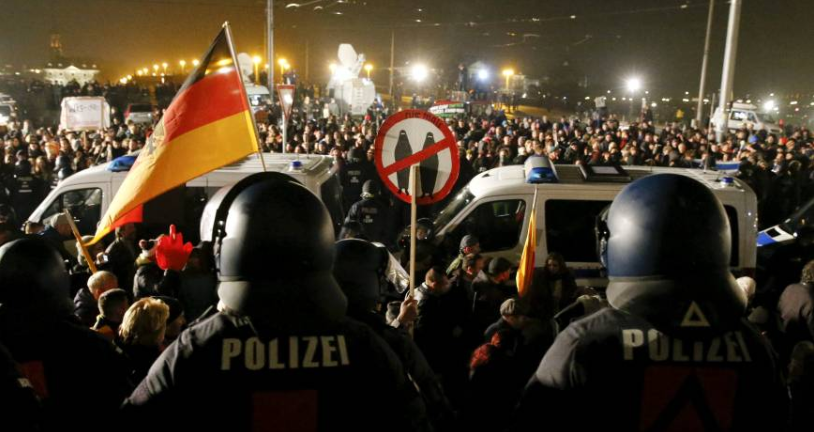
Participants hold a German national flag and a protest banner during a demonstration called by anti-immigration group Patriotic Europeans Against the Islamization of the West (Pegida) in Dresden, Germany, December 15, 2014. /Reuters Photo
Participants hold a German national flag and a protest banner during a demonstration called by anti-immigration group Patriotic Europeans Against the Islamization of the West (Pegida) in Dresden, Germany, December 15, 2014. /Reuters Photo
Once called Florence on the Elbe, and admired for its cultural heritage and beauty, Dresden celebrated its 800th anniversary in 2016. Settled on the northern bank of the river Elbe, the city had a special geographical location, for being in a direct path of Paris and Moscow. In recent history, Dresden developed by turning smelted ore into silver coins.
However, something that has kept the city in news for decades is not its historical significance, cultural richness, or scenic beauty but the rise of far-right movements.
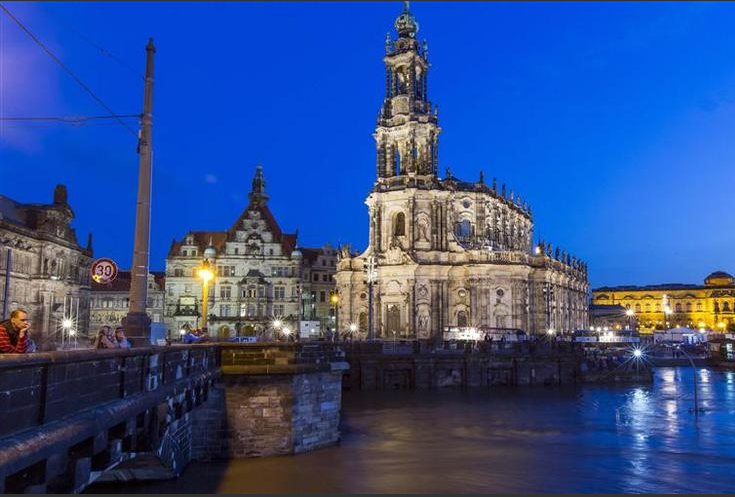
People look at the swollen Elbe river in front of the historic skyline of the east German city of Dresden, June 5, 2013. / Reuters Photo
People look at the swollen Elbe river in front of the historic skyline of the east German city of Dresden, June 5, 2013. / Reuters Photo
In the early 1990s, Dresden became the focal point of neo-Nazi rallies remembering the 1945 Allied bombing which they called "the bombing Holocaust." While the Allied powers asserted that the bombing killed 25,000 people, neo-Nazis put this figure to be around 400,000. Despite conflicting claims over casualty figures, there's no denying the fact that the intensity of the bombing devastated the city's historic center, destroying more than 75,000 buildings.

Dresden after Allied air raids on February 13 and 14, 1945. /AP Photo
Dresden after Allied air raids on February 13 and 14, 1945. /AP Photo
Many say the destruction left a deep wound in the city's heart, which possibly may have paved the way for the rise of far-right forces. They have been accused of exploiting the incident for political propaganda on the pretext of commemoration. Neo-Nazis, who see the bombing as allied barbarity, mark the anniversary with rallies in the city. Counter-demonstrations, however, are organized by political parties, trade unions, associations, and churches.
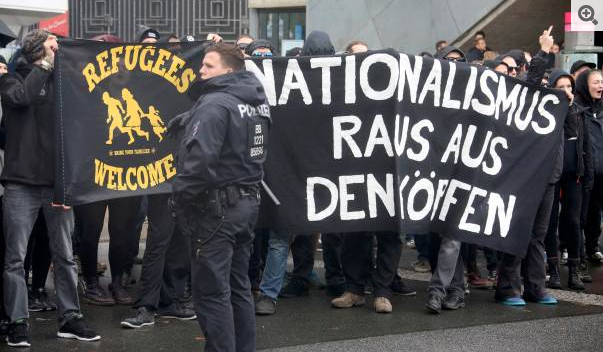
Left wing demonstrators protest against supporters of the anti-Islam movement "Patriotic Europeans Against the Islamization of the West" (PEGIDA) during celebrations marking the German Unification Day in Dresden, Germany, October 3, 2016. /Reuters Photo
Left wing demonstrators protest against supporters of the anti-Islam movement "Patriotic Europeans Against the Islamization of the West" (PEGIDA) during celebrations marking the German Unification Day in Dresden, Germany, October 3, 2016. /Reuters Photo
Dresden with a population of 540,000 is seen as a stronghold of the far-right in Germany. The anti-Islam Pegida movement (Patriotic Europeans against the Islamization of the West) was also founded in Dresden in 2014 by Lutz Bachmann, who is a convicted criminal.
The group continues to regularly draw tens of thousands of demonstrators against Muslim immigration, urging people to "wake up" to the threat of Islamist extremists. The movement has also led to large counter-rallies in the city.
During a survey conducted in 2016, 40 percent of respondents in Saxony argued that Muslims should be prohibited from immigrating to Germany, while nationwide only 16 percent respondents agreed with this view.
Germany has the second largest immigrant population in the world after the United States.
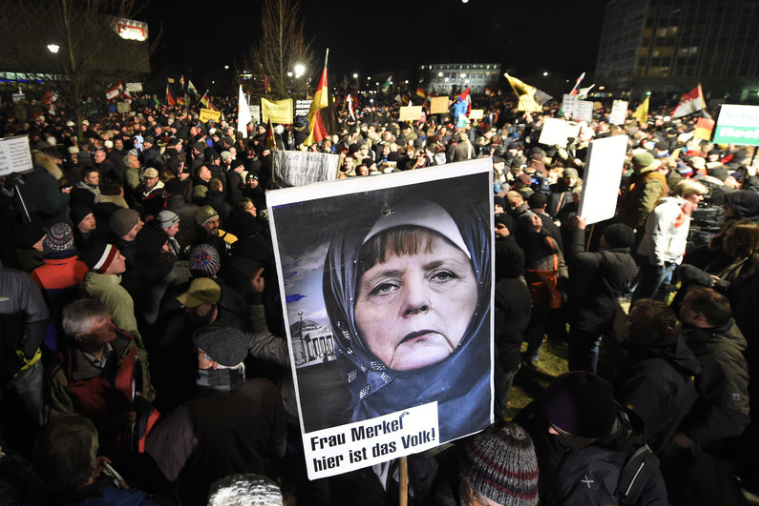
A protester holds a poster showing German Chancellor Angela Merkel wearing a headscarf during a rally organized by Pegida, a group that is against what it calls the "Islamization of Europe," in Dresden, Germany, January 12, 2015. /AP Photo
A protester holds a poster showing German Chancellor Angela Merkel wearing a headscarf during a rally organized by Pegida, a group that is against what it calls the "Islamization of Europe," in Dresden, Germany, January 12, 2015. /AP Photo
On September 2016, a former member of the Pegida movement detonated a pipe bomb at the city's Turkish Fatih Mosque. No one was hurt. The perpetrator was sentenced to nearly 10 years in prison in 2018.
Recent protests in Dresden saw Pegida speakers declaring a close alliance with the far-right Alternative for Germany (AfD) party, which saw rare election success in 2017 that took them to country's parliament.
In state elections in September, AfD's vote share stood at an all-time-high of 27.5 percent in Saxony, up 17.8 percent from 2014. Angela Merkel's center-right Christian Democratic Union (CDU) lost votes in the state but still managed to top with 32 percent.
AfD representatives have been seen at rallies alongside far-right extremists in the eastern German cities of Koethen and Chemnitz, and there have been calls for putting the party under official surveillance.
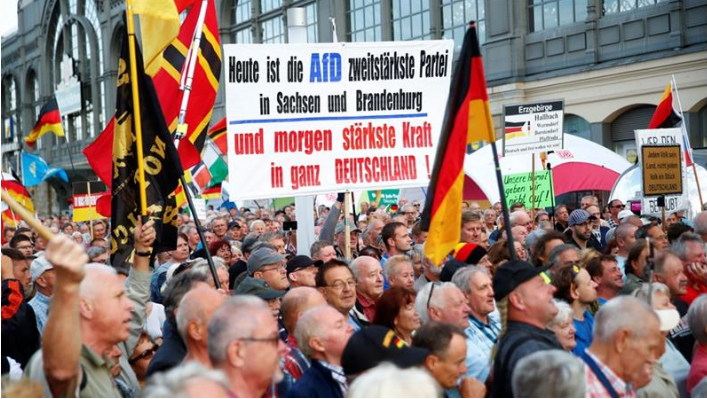
The anti-immigration AfD party wins 27.5 percent votes in Germany's regional elections in September 2019. /Reuters Photo
The anti-immigration AfD party wins 27.5 percent votes in Germany's regional elections in September 2019. /Reuters Photo
Germany, which made "Never Again" the centerpiece of its post World War Two policy, has been battling a rising threat from far-right extremists for some time.
In June, Walter Lübcke, a pro-immigration member of Merkel's party, was assassinated in Kassel, in the German state of Hesse. The suspect in the case was identified as 45-year-old right-wing extremist Stephan Ernst who confessed to killing Lübcke in July to take "revenge" for his pro-refugee stance. However, Ernet later retracted from his confession.
In September, a trial began in Dresden against eight members of a neo-Nazi group accused of plotting terror attacks in Berlin.
Last month, at least two people were killed when a gunman opened fire near a synagogue in the German city of Halle. According to reports, the gunman attempted to storm the house of worship, which was crowded on Yom Kippur, the holiest day in the Jewish calendar.
As Merkel prepares for her exit from German politics, the rise of the far-right and unsettled questions of the past, could spell more trouble for her chosen successor Annegret Kramp-Karrenbauer.
(Cover image via Reuters, designed by CGTN's Li Yueyun)